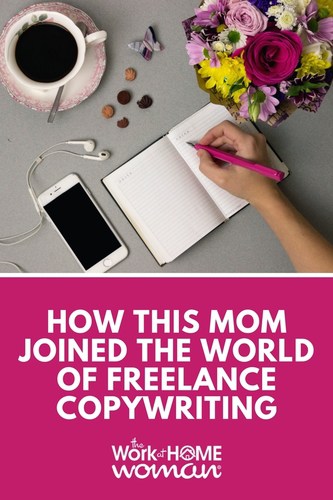Mindy McHorse had always loved writing, but when she went off to college she decided to take a more traditional career route and focused on pre-med. After obtaining her Master’s Degree in Public Health and landing a cushy job in project management, she felt like something was missing from her life. As fate would have it, writing made an unexpected appearance in her life.
Find out how this mom ditched her conventional career path and got back into the world of writing with freelance copywriting.
Tell us a little bit about yourself and your journey in freelance copywriting.
I’ve always loved writing, even as a child. But I always thought of it as a hobby – not something you could ever make a living at (unless you wanted to be the ill-fated “starving artist,” and I’m a lot more high-maintenance than that!).
So I wrote for fun and subscribed to writer magazines, but I took the traditional college route, focusing on pre-med, and then got a master’s degree in public administration. I planned to go on to medical school and then work in public health.
But a funny thing happened on the way to that plan. I had more fun writing my thesis – a 90-page behemoth – than I did researching the topic. I realized I didn’t want to be a doctor, which was a tough epiphany. It was the death of a dream I’d had since I was 12.
I went on to get a cushy job in program management at a medical school since I had a degree that got me there. But making thrillingly complicated spreadsheets wasn’t my idea of excitement, and I had a boss who tried to nitpick and control everything I did – to the point of trying to dictate emails I was supposed to write.
I spent a few months looking for other jobs, but the clock was ticking on my ability to stay sane. That’s when I got a letter in the mail from American Writers & Artists, Inc., which introduced copywriting as a viable freelance writing profession.
I’d made it all the way through grad school without ever having heard of copywriting, so I was plenty skeptical. But I researched it and found nothing but good news.
I still remember the day I announced to my boss I was quitting my job to be a writer. The look on her face was priceless!
 Give us an example of how you landed one of your first clients.
Give us an example of how you landed one of your first clients.
It’s funny because I went months without any clients and then landed my first three all in a two-week period, and in three different ways.
One was a word-of-mouth introduction to a friend of a friend who needed a website written. That happened the same week I went to my first writing conference – it was the AWAI FastTrack to Copywriting Success Bootcamp and Job Fair. I submitted what’s called a “spec assignment” to one of the clients at Job Fair (where you write a portion of a project without the guarantee of payment, but in hopes the client will pick it up). The client liked it and offered to turn it into a paying project.
And the third came through the website DirectResponseJobs.com. I’d responded to a few posts looking for a freelance writer, and the client hired me. That project turned into a year-long gig.
How do you minimize income peaks and valleys?
I’m a terrible person to talk to about any kind of financial planning. But I will say that once I got started as a writer and found those first few clients, I was never without work. And I quickly got to the point where I had too much work and had to refer some of it away.
I’ve never been big on actively self-marketing, either. But the two things I’ve done consistently over the years are:
1) Regularly attending conferences where marketing clients with deep pockets are looking for writers.
2) Being easy to find through my professional writing website and my LinkedIn profile.
Those two things have kept clients coming to me on a consistent basis. I think there’s a ton of value in meeting marketers and fellow freelancers face-to-face because then you form a human connection and you’re much more likely to get referrals and ongoing projects.
Where else do you find new clients?
I haven’t actively looked for new clients in about three years. They all come to me through referrals. But if I were to set out to land a new client, I’d start with DirectResponseJobs.com – that site brought me three long-term retainer agreements. Not every job on there is a high-dollar project, but big-name marketers often post to the site.
What do you believe has contributed to your success?
Raw optimism. I don’t think I’m the best writer in the world by far, but I’m hard to beat on enthusiasm. Some might call it naiveté. Doesn’t matter. I think when you decide to be something, you should go for it. Ignore self-doubt, push past the haters, and surround yourself with people who have done what you want to do. It shows you what’s possible and keeps you fired up.
How are you currently growing your freelance copywriting business?
I’m launching a few of my own websites and writing projects, partly for fun and partly so I’ll have a passive source of writing income that isn’t linked to any clients. That way, if I ever need to take a break from writing for others, I’ll still have a way to monetize my skill.
One of the projects is very much passion-driven – it’s a site called HealingFromPetLoss.com. I went through a tough time two years ago when my little doggie – my “soul dog” – passed away unexpectedly. I had a hard time finding resources that helped me cope, so my goal with this site is to change all that.
What is the biggest mistake you see new freelancers make?
Giving up too soon and thinking they don’t know enough. All you need to know is just a little more than the person who hires you – when you get started, anyway. And you’ll learn fast once you’re actively writing on a project, and especially if you get yourself connected to others in your industry. Industry contacts – which is a stuffy way of saying friends who share your passion – serve as a vital resource for advice during projects, not to mention support. So they also help you stick with it till you can get to the other side of success. Get that far, and you’ll be hooked.
What advice do you have for other freelancers who want to start their own freelance writing business?
Go for it! Sure, there’ll be challenging days. But knowing you’re in charge of your time, income, and freedom is liberating and empowering. Make sure you get yourself a support group, though. It doesn’t always have to be other freelancers. Even having your spouse or best friends on your side can make a world of difference. And on the same note, avoid people who don’t support your goals. You’ll get too caught up in proving them wrong or wondering if they’re right, and that makes it ten times harder to move forward as a freelancer.
On those “don’t feel like it days,” what motivates you to keep going?
When I don’t feel like writing or working, it’s usually because I’m “off” in another way – either it’s been too long since I got out of the house or got some good exercise or spent time with friends. So I don’t force the writing. I take my hesitation as a sign that I need a little space, then I do something that reinvigorates me so I can sit down the next day with renewed enthusiasm.
Trying to write when I’m just not feeling it is like getting a root canal while sprawled out and burning in the blazing hot sun of the desert. Or at least, I assume.
As a mom of four, how do you manage all of your personal and business activities?
My husband and I chose a family motto last year: “Embrace the chaos.” With four kids under the age of five, our goals are constantly in flux. Some days, we feel like we can take a three-day road trip and get home with enough time to host a 20-person barbecue. Other days, it’s a win if we don’t empty out the Band-Aid box and at least get everybody in bed before midnight.
I think it’s important not to be married to outcomes. I have general goals that relate to both our family and my business activities – things like having enough income and time to enjoy our community and have lots of quality outings together. So if everybody’s happy and healthy and I feel like I get enough one-on-one time with each of my kids and my husband, but that I’m also getting enough “me-time” to write and grow my professional goals, then life is good. If I hit specific income goals or get a family vacation in along with all that, even better! But even if I don’t hit those goals or make it to the beach this year, that’s okay, because I feel like this lifestyle makes it possible for me to savor every single day I’m alive.


 Give us an example of how you landed one of your first clients.
Give us an example of how you landed one of your first clients.





I want to work at home so I need job I want to earn money
These articles will give you a great place to start your WAH job search:
https://www.theworkathomewoman.com/best-work-from-home-jobs/
https://www.theworkathomewoman.com/right-job/
https://www.theworkathomewoman.com/work-home-jobs-location/